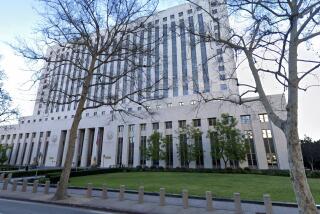Loot’s Finder, Torrance Clash Over $24,000
Doing the right thing can be a hassle. Just ask Terry Walker of Torrance.
Walker found $24,000 in cash two weeks ago outside his condominium in Torrance. He turned the money over to police, saying later that he expected it would be returned to him if authorities could not find the rightful owner.
But last week, Torrance police said they intended to confiscate the cash under provisions of a state law that permits authorities to seize drug money. The Police Department relented a little Wednesday, saying it will reward Walker’s honesty with $2,500 of the money that they suspect was dropped by drug dealers.
Terry Walker said Wednesday that he appreciates the pat on the back, but he would rather have the cash--all of it.
“I thought I would get the money back, because I knew nobody would claim it,” said the 27-year-old medical technician. “They are not going to walk up and say, ‘I am the drug dealer who lost the money.’ ”
Walker said he had no idea the police would keep most of the money. And he is not happy.
“I didn’t see what significance $20,000 had to them, when they make these huge drug busts,” he said. “I didn’t see how it was going to help them.” But he could think of plenty of ways he could spend the money on his wife and young son.
Despite the commotion, Walker said he still believes he did the right thing when he turned the cash over to Torrance police on Oct. 5.
Walker overslept that morning and was hurrying to get to his job with a Los Angeles medical clinic.
As he pulled away from the curb on Plaza Del Amo, Walker said he saw a box lying in a pile of leaves and debris by the side of the road. Walker said he stopped only because the box was sealed. He wondered what was inside.
“I just saw all that money and my jaw was hanging down,” he said. “I just kept saying, ‘Oh my God! Oh my God!’ ”
Walker ran back into his home, yelling to his wife to call the police. By the time they arrived, Walker’s wife was counting the cash.
Torrance detectives told the couple they would take the money back to the station, because they believed it was the proceeds from a cocaine sale.
Department spokesman Ron Traber said he thought Walker should get the money back.
But last week, the department asked the district attorney’s office to begin a formal procedure to keep most of the money under the state’s narcotics assets forfeiture law. The authorities must publish legal notices and provide 30 days for anyone to lay claim to the cash.
If the department can prove the money was connected to a drug sale, and that no one else is the rightful owner, it will receive 76.5%. The district attorney’s office will net 13.5% and the state will receive 10% of the proceeds.
There was no mention of a cut for Walker.
On Wednesday, the department relented, a little.
Police Lt. David Marsden said Torrance will go ahead with the asset forfeiture procedure, but will give Walker $2,500, if it is successful.
“I told him when I first talked to him that I admired his honesty,” Marsden said. “And I still admire it today. . . . We are going to recognize his efforts to take drug money off the streets.”
Walker said he may hold out for the entire amount.
“The police really didn’t do anything to get the money,” he said. “I handed it over to them.”
He plans to consult an attorney to see if he can successfully claim the cash under the asset forfeiture law.
Torrance officials do not think so. They noted that the state law only requires them to prove that the money was related to a drug transaction.
Marsden said that was proven on the day the box was found, when a specially trained drug detection dog “alerted” on the box. The dog--a black Labrador retriever named Bronco--was able to find the cocaine-tainted loot after it was hidden in a detective’s desk inside the Torrance Police Department.
But Walker said he’s not sure the dog test will stand up in court.
Indeed, chemical tests have shown recently that the vast majority of the nation’s currency may be covered with cocaine residue. According to an article this spring in the journal Science, only four of 135 bills sampled in a nationwide survey were not tainted with cocaine particles.
Authorities speculate that money is contaminated when it is stacked next to large stashes of cocaine or when the bills are rolled and used to inhale the drug. The powder then rubs onto other bills when the money is stored inside wallets, cash registers and bank vaults, according to Dr. Lee Hearn, the toxicologist who conducted the research into cocaine contamination.
“There certainly is doubt as to the significance of a dog alert,” said toxicologist Jay Poupko, whose research has paralleled Hearn’s. “More than 95% of the currency we have analyzed was contaminated with cocaine.”
Walker believes the city’s case might be vulnerable, if he decides to file a petition in Superior Court for the money.
“Legally, I don’t think they can tie it into any transaction or (drug) activity,” said Walker. “All they have to go on is the dog.”
Despite the disagreement, Walker said he still looks on his discovery as good fortune.
“It has been more of a hassle than I anticipated,” he said. “I didn’t know all this stuff was going to happen. . . . I guess it’s an experience you learn from.”
More to Read
Sign up for Essential California
The most important California stories and recommendations in your inbox every morning.
You may occasionally receive promotional content from the Los Angeles Times.







